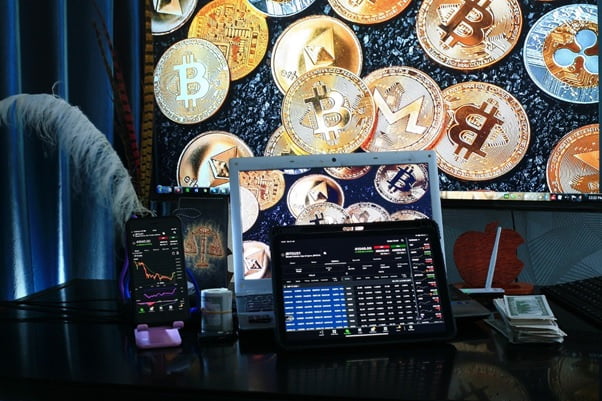
Amidst the dynamic shifts within the global trade and financial realm, a remarkable disruptor has taken center stage, reshaping our perspectives on equitable trade and environmentally responsible supply chains. This decentralized digital currency, previously associated predominantly with speculative financial endeavors, has ingeniously carved out an unexpected and impactful niche in bolstering the integrity of fair trade coffee supply chains. Its emergence has paved the way for heightened levels of transparency, operational efficiency, and empowerment, transcending conventional boundaries and benefiting all stakeholders engaged in this process. There are many platforms like immediatemomentum.net which can let you trade bitcoin easy and at the same time safely.

Embracing Decentralization: A Paradigm Shift in Fair Trade
The Genesis of Change: Aligning Values and Technology
The concept of fair trade has remained a steadfast champion in its mission to empower marginalized coffee farmers by ensuring just compensation for their toil and fostering ecologically sound methodologies. Nonetheless, the conventional fair trade paradigm has encountered hurdles pertaining to its ability to ensure robust accountability, traceability, and a comprehensive influence. In this context, Bitcoin emerges as a transformative force, embodying the qualities of decentralization and incorruptible digital record-keeping. This intrinsic alignment with the foundational principles of transparency and responsibility central to fair trade breathes new life into the movement, propelling it toward enhanced efficacy and impact.
Blockchain: The Backbone of Transformation
At the heart of Bitcoin’s impact on fair trade coffee supply chains is the blockchain technology that powers it. Blockchain acts as an immutable digital ledger, recording every transaction in a transparent and secure manner. When applied to fair trade, this technology allows for the creation of an unalterable record of every step in the supply chain, from the moment a coffee bean is planted to the final cup poured.
Empowering Farmers: Direct Transactions and Financial Inclusion
Bitcoin enables direct peer-to-peer transactions without intermediaries, ensuring that coffee farmers receive the full value of their products without the need for multiple layers of middlemen. This is particularly impactful in regions where banking infrastructure is limited. Coffee farmers can now participate in the global economy without relying on traditional financial institutions, fostering financial inclusion and economic empowerment.
Navigating Challenges: Overcoming Obstacles for Progress
Volatility and Risk Management
A prevailing critique frequently directed at Bitcoin revolves around its intrinsic volatility, characterized by swift and substantial fluctuations in its valuation, potentially jeopardizing stakeholders engaged in fair trade. Nonetheless, the ongoing discourse has spurred the creation of inventive remedies aimed at curtailing this concern, including the implementation of instantaneous conversion mechanisms that seamlessly transform Bitcoin holdings into local currency upon receipt. By adopting such measures, the exposure to the inherent price unpredictability of Bitcoin is effectively curtailed, fortifying the resilience and stability of fair trade endeavors.
Environmental Concerns
The energy-intensive nature of Bitcoin mining has raised concerns about its environmental impact. Critics argue that the carbon footprint associated with Bitcoin undermines the sustainability goals of fair trade. Nonetheless, the cryptocurrency community is actively exploring ways to transition towards more energy-efficient consensus mechanisms, lessening the ecological footprint of Bitcoin.
The Future of Fair Trade Coffee: Unleashing Potential
Enhanced Transparency and Trust
Bitcoin’s integration into fair trade supply chains creates an unparalleled level of transparency. Consumers can trace the journey of their coffee beans, verifying their origin and the conditions under which they were produced. This transparency fosters trust between consumers and producers, strengthening the connection between the two ends of the supply chain.
Streamlined Logistics and Efficiency
Blockchain technology enables the automation of various logistical processes, from inventory management to shipping and tracking. Smart contracts can be programmed to execute actions automatically when specific conditions are met, reducing delays and human errors. This newfound efficiency translates to cost savings and improved supply chain performance.
Redefining Impact Measurement
The integration of Bitcoin in fair trade opens up new avenues for measuring the impact of sustainable practices. Smart contracts can include criteria for assessing social and environmental performance, providing quantifiable data on fair trade’s contributions to local communities and ecosystems.
Conclusion: A New Era of Fair Trade
Within the convergence of Bitcoin and fair trade coffee supply chains, a realm of unprecedented possibilities unfurls. The intricate interplay between the core tenets of decentralization and sustainability holds the key to reshaping our paradigms surrounding trade dynamics, empowerment mechanisms, and international collaboration. As we navigate the intricate landscape that this visionary alliance presents, it becomes evident that the horizon of fair trade is adorned with substantial potential – a potential that is underpinned by the remarkable and transformative prowess exhibited by Bitcoin.
[custom-twitter-feeds feed=2]





